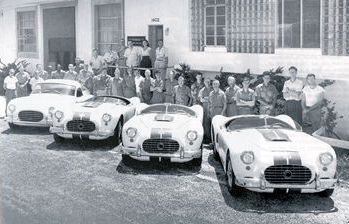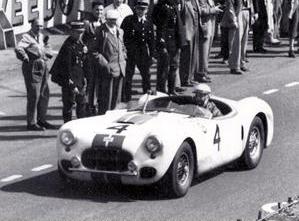The Le Mans Era
1951: Progress
Text by Kane Rogers

Team Cunningham members pose with their handiwork just before the cars are
whisked off to the Mauritania in New York for the trip to Le Mans, 1951.
The Healey proved a success, taking second place at Palm Beach Shores, then scoring first and second in the two races at that fall’s Watkins Glen Grand Prix. Sadly, this was also the last race for Sam Collier, who died after crashing Briggs’ Ferrari during the feature race.
Work proceeded through late 1950 at the new facility, with one problem: Cadillac had suddenly withdrawn its supply of engines. Searching for a solution, Briggs called on an old Yale chum, Bob Keller, whose father, K.T. Keller, was head of engineering at Chrysler. It turned out that K.T. had just the thing for Team Cunningham: the brand-new Chrysler Firepower Hemi V-8.
The first five Cunningham cars were begun in order to finish the racing versions in time for shipment to France. The first two were street prototypes, designated C-1, in which various suspensions and other systems were tried while the three race cars, designated C-2R, were completed in three months by a dedicated crew of 32, working 80-hour weeks. The cars arrived at Le Mans with a total of 20 hours’ testing between them.
The race was dominated by Jaguar’s new C-Types which were light, purpose-built and enjoyed the overwhelming advantage of Dunlop’s new disc brakes. Despite this, the Cunninghams showed well, until George Huntoon hit a concrete marker and wiped out the steering on the C-2 he shared with the boss. Then George Rand, in heavy rain, crashed the car he co-drove with Fred Wacker, leaving the Fitch-Walters car to carry on alone. By Sunday morning, it was well into second place, but then a connecting rod failed and it slowed to finish fifteenth.
Nonetheless, the car had held second for six hours, had run the fastest on the Mulsanne Straight at 152mph, and had run a lap at almost 99mph. The effort was dubbed a success and the team returned home to score victories at the Glen and Elkhart Lake. They also began work on the next series of cars, the road-going C-3 and racing C-4R.

The Fitch/Walters C-2R rolls across the finish line
4pm Sunday, winning its class.
Website Disclaimer
Please read the disclaimer prior to entering this website. You may access it by clicking here.